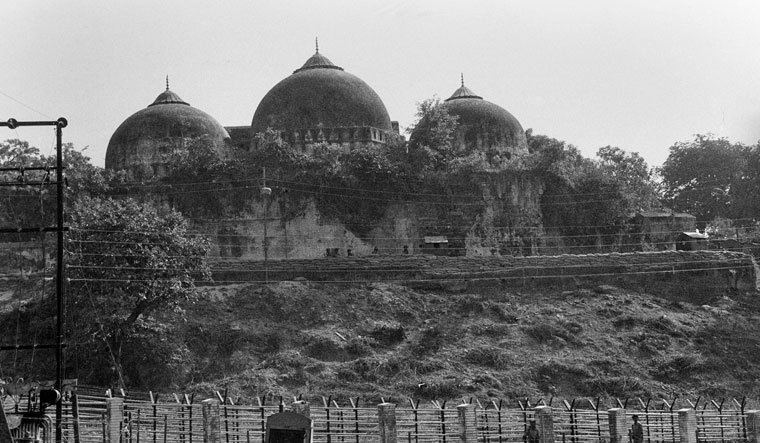A five-justice Constitution bench of the Supreme Court ruled on Saturday in a unanimous verdict that the disputed land at Ayodhya must be given to a trust for construction of a Ram temple and ordered the Central government to formulate a scheme within three months. It ordered that the Muslims must be given alternate land. It ordered that the Sunni Waqf Board must be given five acres of alternate land.
The Supreme Court observed the title dispute was a matter that could not be decided on the basis of faith and belief, but as per law. The Supreme Court held the Sunni Waqf Board, the main Muslim petitioner, and Ram Lalla, the deity, must get relief.
The Supreme Court first dismissed a special leave petition filed by the Shia Waqf Board against a Faizabad court's order of 1946 that had ruled the Babri Masjid was a Sunni mosque. The Supreme Court observed the Babri Masjid was "built by Mir Baqi" on order of Mughal Emperor Babar and idols were placed in the mosque in 1949. The Supreme Court also ruled that the Nirmohi Akhara was not a Shabait (devotee) of Lord Ram and noted Ram Janma Bhoomi "not a juristic person", holds Supreme Court.
The Supreme Court ruled that the report of the Archaeological Survey of India on Ayodhya could not be brushed aside and observed the Babri Masjid was not built on vacant land. Gogoi said the evidence showed a "temple existed at the site". The Supreme Court ruled that the report of the Archaeological Survey of India on Ayodhya could not be brushed aside and observed the Babri Masjid was not built on vacant land. Gogoi said the evidence showed a "temple existed at the site". However, the Supreme Court said the ASI report did not support whether the temple was demolished. The Supreme Court noted the "faith and belief" of the Hindus that Ram was born in Ayodhya was "undisputed".
also read
- Places of Worship Act hearing: Will Supreme Court strike it down?
- ‘There should be a limit’: Fresh pleas over Places of Worship Act irks CJI-led bench in SC
- Grand celebrations on the anvil to mark first anniversary of Ayodhya Ram Mandir pratistha
- Controversy over Ram Mandir tableau for India Day parade in New York explained: 'Target of hate crime'
- Like Ayodhya, INDIA bloc will defeat Modi, BJP in Gujarat: Rahul Gandhi
The Supreme Cour held that the Babri Masjid was not abandoned and mere cessation of namaz by Muslims could not lead to inference that mosque was abandoned.
The verdict was delivered in court number one of the Supreme Court.
The Ayodhya case is considered a watershed in India's political and social history, given the communal tension that erupted following demands to build a Ram temple at the site of the Babri Masjid and subsequent demolition of the mosque in December 1992.
The five-justice Constitution bench of the Supreme Court that delivered the verdict on the petitions in the Ayodhya case was headed by Chief Justice Ranjan Gogoi and consisted of Justices S.A. Bobde, D.Y. Chandrachud, Ashok Bhushan and S.A. Nazeer.
The Supreme Court had on August 6 commenced day-to-day hearings in the Ayodhya dispute, which finally concluded on October 16, following which the five-member bench reserved its verdict. The verdict was expected to come before the retirement on November 17 of Chief Justice Gogoi. Gogoi had cancelled a foreign visit, emphasising the attention the Constitution bench was giving to the Ayodhya verdict and other key impending judgments such as appeals against the Rafale deal. Security had been beefed up outside the residences of justices Bobde, Chandrachud, Bhushan and Nazeer ahead of the verdict. Chief Justice Gogoi had met officials of the Uttar Pradesh Police on Friday to assess security preparations in the state.
The Supreme Court verdict in the Ayodhya dispute was delivered in response to 14 appeals filed against a Allahabad High Court order of 2010. The Allahabad High Court had ordered that the disputed property, spanning 2.77 acres, be divided equally among the petitioners to the Ayodhya dispute: the Sunni Waqf Board, the Nirmohi Akhara and Ram Lalla.
Earlier this year, the Supreme Court had also appointed a three-member mediation panel—comprising former Supreme Court justice F.M.I. Kallifulla, Art of Living founder Sri Sri Ravi Shankar and legal mediator Sriram Panchu. While the mediation panel reported in August it had not achieved substantial results, the Supreme Court allowed it to resume work in parallel with its daily hearings.




.jpg.image.100.58.jpg)
.jpg.image.100.58.jpg)




